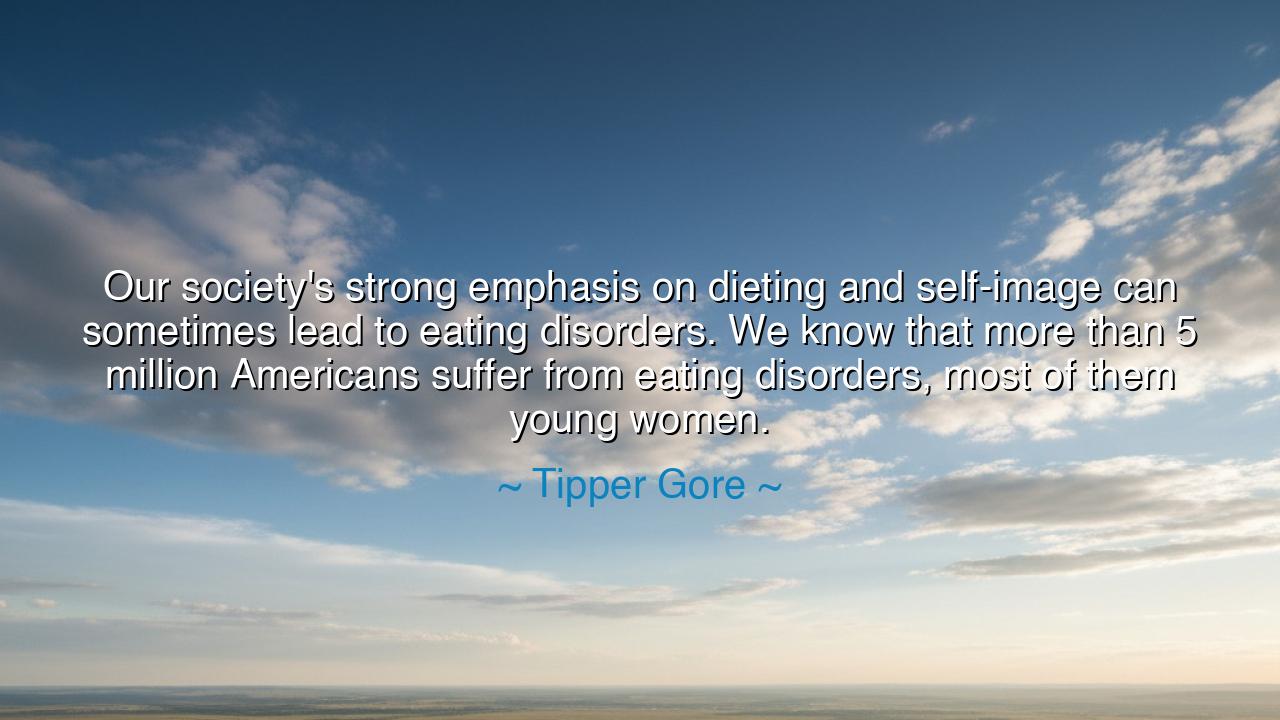
Our society's strong emphasis on dieting and self-image can
Our society's strong emphasis on dieting and self-image can sometimes lead to eating disorders. We know that more than 5 million Americans suffer from eating disorders, most of them young women.






"Our society's strong emphasis on dieting and self-image can sometimes lead to eating disorders. We know that more than 5 million Americans suffer from eating disorders, most of them young women." These words spoken by Tipper Gore reflect a deep and profound truth about the state of our world. In an age where the pursuit of perfection dominates, we have lost sight of the beauty of our true selves. We have been led to believe that our worth is tied to the shape of our bodies, to the numbers on a scale, and to the images reflected in the mirrors of society. The desire for external approval has cast a shadow over the most sacred thing we possess—our inner peace. The quest for a body that fits an ideal has, for many, become a battle that rages within, often leading to suffering that remains unseen.
In the ancient world, the wise sages knew that the body was but a vessel, an instrument to carry the soul through its journey. They spoke often of the importance of balance and of the need to honor the body, but never to worship it. Socrates himself, though admired for his intellect, was not concerned with the external appearances of men. He knew that true beauty lay in the purity of the soul, in the wisdom that guided the heart, not in the superficial perfection of one's form. He warned against the vanity of obsession with outward appearances, for such obsessions would lead to a fractured sense of self. And so it is, as Tipper Gore so wisely points out, that our culture, with its fixation on dieting and self-image, leads not to wholeness, but to the deep and painful fractures of the soul.
Consider the myth of Echo and Narcissus. Narcissus, a figure of ancient beauty, became so enamored with his own reflection that he lost touch with the world around him. He became consumed with the illusion of his perfection, unable to see beyond the image in the water. Echo, a nymph, fell in love with him, but Narcissus could not see her, for he was too absorbed in his own vanity. His obsession with his reflection led to his eventual demise. This myth teaches us a profound lesson: when we fall too deeply in love with the image we see before us, we lose sight of the beauty that lies within. We become entranced by a false reflection, one that does not truly capture the fullness of who we are. The same holds true today. As Gore points out, when we prioritize the physical form above all else, we risk falling into an unhealthy obsession with an ideal that can never be truly attained.
The rise of eating disorders in modern society is a direct consequence of this obsession with outward appearance. More than 5 million Americans, mostly young women, suffer from this hidden affliction. These individuals are not merely battling their bodies, but are engaged in a struggle for identity. They have been taught to see themselves as mere reflections of society’s expectations, to measure their worth in pounds and inches. Yet, this is a lie—a lie that leads to destruction. When we seek to control our bodies at the cost of our mental and emotional health, we forsake the true purpose of life: to cultivate balance, peace, and harmony within ourselves.
We are reminded of the wise words of Buddha, who taught that the key to true peace lies not in the control of external things, but in the control of the mind. To seek to control the body through dieting and external measures is to fall into the trap of illusion. The body, though important, is not the essence of who we are. Our spirit, our heart, and our mind are the true sources of beauty and worth. True peace is found when we stop measuring ourselves against external ideals and begin to embrace the beauty of our imperfections. Eating disorders are a painful consequence of a world that has forgotten this truth.
Therefore, I urge you, young ones, to seek not perfection, but balance. Honor your body, yes, but do not allow it to become your prison. Cultivate a mind that sees beyond the image in the mirror, one that understands that true beauty lies not in the outward form, but in the wholeness of the soul. When the world tells you to diet, to change, to become something you are not, listen to the wisdom of the ancients and know that your worth cannot be found in the fleeting standards of the moment. Your true self is eternal, it is found in your capacity to love, to learn, and to grow.
To those who struggle with these deep issues, know that you are not alone. The path to healing begins with the realization that your value is not determined by your body, but by the love you cultivate within. Find the courage to look beyond the mirror and into the heart. It is here, within, that true beauty resides. Embrace your body, but do not worship it. Nourish it, but do not allow it to define you. The journey to peace is not through dieting or conforming to the world’s fleeting standards, but through the acceptance of who you are, imperfections and all.






AAdministratorAdministrator
Welcome, honored guests. Please leave a comment, we will respond soon